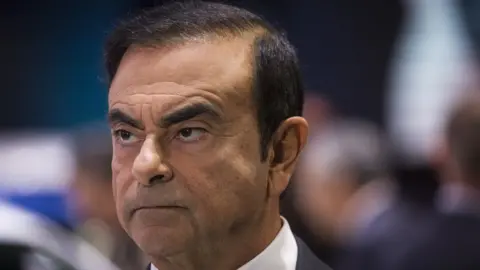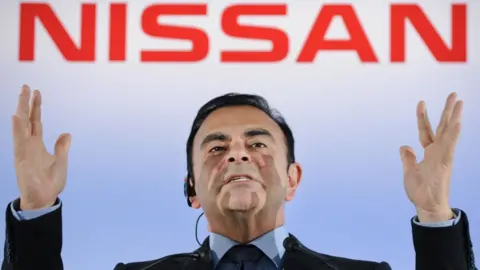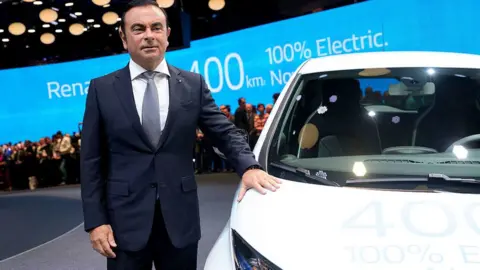Carlos Ghosn: Former Nissan chair charged with financial misconduct
 Getty Images
Getty ImagesJapanese prosecutors have charged former Nissan chairman Carlos Ghosn with financial misconduct, accusing him of under-reporting his pay package over a five-year period.
He has also been re-arrested on further allegations of under-stating his pay, which is likely to keep him in detention until 30 December.
Mr Ghosn has previously denied the accusations.
Prosecutors have also charged Nissan in relation to the case.
Mr Ghosn was arrested in November after the allegations first surfaced. Monday was the last day he could be held by authorities before he either had to be charged or released.
His defence team say the accusations against Mr Ghosn are invalid because they do not relate to his salary, but to future payments that he was expected to receive after retirement.
'Deepest regret'
Nissan said it was taking the situation "extremely seriously".
"Making false disclosures in annual securities reports greatly harms the integrity of Nissan's public disclosures in the securities markets, and the company expresses its deepest regret," the carmaker said in a statement.
A source close to the firm said that the charges were not unexpected "given the company flagged its concerns" to prosecutors after it had conducted an internal investigation.

 Getty Images
Getty ImagesAnalysis
Rupert Wingfield-Hayes, Japan Correspondent
The new charges against Carlos Ghosn will allow prosecutors to continue detaining him until 30 December.
His interrogations will continue and can be done without Mr Ghosn having his lawyer present.
In Japan there is nothing surprising about this. But elsewhere there has been real shock at the draconian nature of Japan's justice system.
American attorney Professor Alan Dershowitz today likened Japan's system to that of authoritarian regimes like Iran, Cuba and even China.
Secondly Carlos Ghosn has been effectively accused of the same offence twice.
The new arrest warrant accuses him of under-reporting his pay for a further three years (2016-18).
A former prosecutor, I have spoken to, says this suggests the Tokyo prosecutors have no other evidence of wrongdoing against Mr Ghosn.
If that is the case, the former prosecutor told me, the case against Mr Ghosn is very weak.
But he says, because it is such a high-profile case, they will feel compelled to press charges and take the case to its conclusion.

If Mr Ghosn is convicted, the charges could mean up to 10 years in prison. The charges also carry a fine of up to 700m yen ($6.2m; £4.9m), according to the Japanese regulator, the Securities and Exchange Surveillance Commission.
Originally, prosecutors said that Mr Ghosn and senior executive Greg Kelly - who has also been charged with financial misconduct - had conspired to understate Mr Ghosn's pay from 2011 to 2015. The fresh charges, issued on Monday, allege they did the same thing from 2016 to 2018.
From 2010, Japanese firms have been required to disclose the salaries of executives who earn more than 100m yen ($888,000; £697,000).

Who is Carlos Ghosn?
 Getty Images
Getty Images- His hero status was so big that his life was serialised in one of Japan's famous cartoon comic books
- The Brazilian-born boss of Lebanese descent and a French citizen says his background left him with a feeling of being different, which helped him adapt to new cultures
- In France he was known as Le Cost Killer, a comment on the deep cuts he made to revive Renault
- He was once tipped as a potential president of Lebanon, a move he eventually dismissed because he already had "too many jobs"
- In a 2011 poll of people the Japanese would like to run their country Mr Ghosn came seventh, in front of Barack Obama (ninth)

Carmaker alliance
Brazil-born Mr Ghosn, aged 64, known as the Le Cost Killer for his radical approach to restructuring, was the architect of the Renault-Nissan alliance, and brought Mitsubishi on board in 2016. In the past, he has been hailed a hero in Japan for turning around the ailing Nissan.
French car maker Renault was seen as the dominant partner due to its 43% shareholding in Nissan, despite selling fewer vehicles. Nissan's shareholding in Renault is only 15%.
Sources close to Mr Ghosn have previously described the accusations as a "clinically planned hatchet job", arguing they were aimed at resetting the balance of power in the carmakers' alliance.
While the governments of Japan and France insisted that the alliance of companies that manufactured 10 million cars last year should be preserved, it is widely thought that Nissan executives were uncomfortable at the power wielded over the company by Renault and concentrated in the hands of Mr Ghosn.
Nissan and Mitsubishi both sacked Mr Ghosn as chairman after the arrest last month.
But Renault has held off doing so, saying he would remain as its chairman and chief executive, but has appointed a temporary deputy chief executive to take over the running of the firm.
